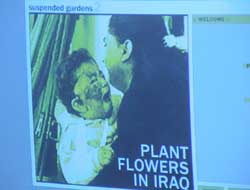Suspended Gardens: Net Art with a Political Edge
|
4.22.03 - "While the Internet offers itself as a great forum in which to exchange ideas, I don't believe its promise has been realized," says Alex Dragulescu, with a concerned shrug. He is a first-year graduate student in the UCSD Visual Arts department working under New Media Arts layer leader Sheldon Brown. "A lot of net art is modernistic and focuses on the visuals. I undertook Suspended Gardens to explore the potential of the Web for art that is more engaged socially and politically, not just aesthetically." Harkening back to the revolution in 1989 against Ceaucescu in Romania, Dragulescu's native land, when people "planted" flowers in gun barrels of the troops defending the dictator, and mindful of the war looming a month ago against Iraq, Dragulescu created an environment in which people can sow and care for virtual plants in Iraq. Visitors to his Web site can study National Geographic maps and choose the best (or worst) locations for plants based on the plants' affinities for people, sun, or oil fields.
The name of the environment is based on the "suspended gardens" of ancient Babylon (c. 2250 BC), one of the seven wonders of the world, considered to be some of the most startling examples of creativity ever. Suspended Gardens is described on the Web site's home page as "a metaphor that references history, borrows meanings from contemporary culture, and offers a political commentary in a subtle, playful way. It is a hybrid between an interactive Flash game, a messageboard, and a simulation system rendered relevant by the current conflict in Iraq." "I wanted to focus on something creative to counter the destruction inherent in fighting and war," says Dragulescu. "I posted my site to a handful of mailing lists and, after less than a week, more than 1000 people had visited and nearly 500 had planted plants. Now the word is spreading, and usage is increasing." The site was launched March 21. Dragulescu maintains that modern-day warfare tends to be a silent process. "Coverage of the war is superficial," he says. "What's real is lost through so many layers of multimedia and decisions broadcast editors make about what they want you to see. After the first few days of the war, the networks began to loop similar kinds of imagery, causing the public to become detached from the whole experience."
Suspended Gardens, instead, invites people to engage and express their opinions. "When planting a flower," says Dragulescu, "you have the opportunity to leave a message. You can also read messages left by others - everyone that comes to my site can read anything that's posted. I believe this kind of open, uncensored forum is especially important right now. People need to interact with each other to understand what's going on in Iraq." Most of the messages are anti-war, though there are also messages supporting the troops. And the messages are written in a number of languages besides English. The site also emphasizes the importance of caring for something on a regular basis to make it flourish: Plants that are visited regularly by those that sowed them grow faster. "I expect each user will have a different experience visiting my site," says Dragulescu. "I wanted users to connect with war through flowers. With some, sadly, that will be the only way they connect, but that's a step forward over the disconnection so many feel watching TV news coverage." Turning to the darker aspects of his project, Dragulescu suggests that it's a critique of the superficiality of the modern western lifestyle and the "utopia" promised by Internet technology. For example, the messages you can leave on the site pointedly can be no longer than 100 words to underscore the fact that our lifestyle doesn't permit engaging in a more substantial dialog. Lots of art is conceptual, meant for academia and the intellectual elite, Dragulescu points out, and he personally is at a crossroads in defining his career goals. "I want to do more in terms of bringing art to the public, to other types of audiences that don't normally experience it. The Internet has the promise of doing that, but, again, it seems to be used mostly for things like pornography or just chatting. I'm starting to formulate my next project, and I want it to be a game where people don't directly express ideas but engage with the piece in ways other than through text communication." Dragulescu has plans to further develop Suspended Gardens. In particular, he'd like to implement more complex interactions, such as algorithms to control more exactly how the plants grow. For example, when bombs fall, they stir up the earth, which, ironically, can cause plants nearby to grow faster. To visit the site, go to www.suspendedgardens.net. It requires use of the latest Flash plug in, which can be downloaded through this site. |
|



